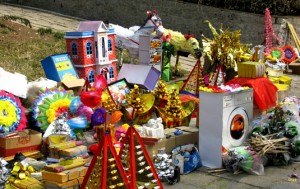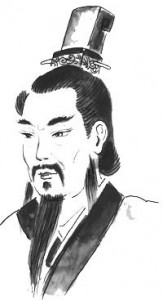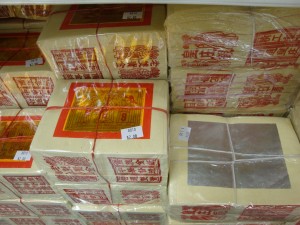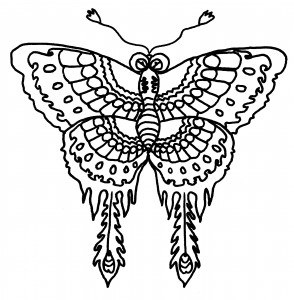清明节 Qing Ming Festival
Information About the Holiday | Common Sights During the Holiday | Festive Activities | Recommended Books, CDs and DVDs
Information About the Holiday
The Qing Ming festival (say “ching ming”) is a major holiday in Chinese society that has been celebrated in since 3700 B.C. Depending on the year, Qing Ming falls on the 4th, 5th or 6th of April. The name Qing Ming (清明), literally means “clear and bright” and is a reference to the warm weather that follows the cold and snow of winter. It also marks the traditional time for farmers to plough their fields for spring planting.
In the English-speaking world, Qing Ming has many different names. The most common names are the Clear Brightness Festival and Tomb Sweeping Day. Why Tomb Sweeping Day? Qing Ming is an important holiday for honoring one’s ancestors, so families often visit family graves to clean them and make offerings. In traditional Chinese culture, people believe the dead play a powerful role in helping to guide the lives of the living, thus it is very important to honor and celebrate them.

A collection of paper items that will be burned for the ancestors so that they may have these things in the spirit world. Photo by GoogleMei
While Chinese people make offerings of food, wine and ghost money to their ancestors throughout the year, they spend extra time honoring the dead during Qing Ming. Chinese people journey to the burial sites of their ancestors, sweep graves, pull weeds and carefully repaint the words on the tomb.
Once the ancestors’ graves have been swept, families light candles and burn incense and paper money (also called ghost money) to honor the dead. They lay out fancy dishes of roast duck, chicken, pork, sugar cane, mandarin oranges, rice, wine and tea in front of the graves as further offerings. Each family member bows before the grave to show respect to the ancestors. Then they pour wine and tea around the grave and set off firecrackers.
After the ceremonies, everyone enjoys a delicious feast. Families often have picnics in the countryside during Qing Ming. The afternoon is spent playing games and flying kites. Kite flying is a traditional Chinese game that is thought to be good for one’s health and a fun form of exercise.
Qing Ming is often celebrated together with a more ancient holiday called Han Shi or the Cold Foods Festival, which falls on the day before Qing Ming. During this festival, people only eat foods that don’t require fire to prepare in order to honor the memory of Jie Zitui (say “jie dz tway”) and his loyalty to the emperor of the Jin dynasty.
THE STORY OF JIE ZITUI
Thousands of years ago, during the Spring and Autumn period of China, Duke Xiao (say “she-ow”) was the ruler of the state of Jin. While his eldest son, Shen Sheng should have become the next ruler of the state of Jin, Duke Xiao had other plans. He had fallen in love with his second wife and wanted her son to become the next ruler. To make this possible, he banished his three sons, Shen Sheng, Chong Er (“chong ar”) and Yi Wu (“ee woo”) from the kingdom.
For 19 long years, Chong Er and his loyal officials and servants wandered in the mountains without food or shelter. Slowly, Chong Er was starving to death. One of his most faithful followers, Jie Zitui, cut a piece of muscle from his leg, cooked it in a stew with wild herbs and served it to his master, thereby saving his life.
After many long years, Chong Er finally managed to take back the throne that was rightfully his and rule the state of Jin. Once in power, Chong Er decided to reward the officials who had stayed with him through his years of wandering, but he forgot about Jie Zitui. Jie Zitui was disappointed and upset, so he and his mother left to live in the mountains as hermits.
Months passed before Chong Er remembered Jie Zitui’s sacrifice and sent people to look for him. Jie Zitui heard that Chong Er was trying to find him, but he had no interest in any kind of reward, so he moved deep into the forest to hide. In desperation, Chong Er ordered the forest to be set on fire so Jie Zitui would be forced out. His men set fire to several trees on one side of the forest, while Chong Er waited on the other side. For three days and nights, the fire burned wildly, but no one saw Jie Zitui or his mother. Finally, Chong Er and his men went into the burnt forest where they found the bodies of Jie Zitui and his mother next to a willow tree.
Chong Er was overcome with remorse and grief. He ordered a temple be built in memory of his most loyal follower and that no fires be lit on the anniversary of Jie Zitui’s death.
Common Sights During the Holiday
金纸 Ghost Money or Joss Money: Stacks of ghost money are burned in honor of one’s ancestors as a way to ensure they are prosperous in the afterlife.
风筝 Kites: Kites were invented in China more than 2,000 years ago. During the Warring States Period (475 – 221 B.C.), Chinese people made the first wooden kites. These early kites were not used as toys, rather they were used for military purposes. Historical records show that these kites were very large in size. Some were even strong enough to carry men up into the sky to observe enemy movements. Other kites were used to send messages.
During the Tang dynasty (618-907 A.D.), people began to tie pieces of bamboo to the tails of their kites. As the kites flew , they made noises that sounded like a string instrument called a zheng. Since then, the popular Chinese name for a kite is fēngzheng or “wind zheng.”
Today in China, flying a kite is not just a game for children. Many adults fly kites as a form of exercise. People fly kites in the city and in the countryside. A popular time for flying kites is just before the Qing Ming festival in April as the weather is so favorable. According to a common Chinese custom, one should set a kite free when it is high in the air, so it will fly away and take bad luck and evil spirits with it. Because of this, it is considered bad luck to pick up a lost kite.
Festive Activities
Make a Quick and Easy Kite: Kite Instruction Sheet and Simple Kite Template
Kite Coloring Pages: Butterfly Kite Coloring Page Dragon Kite Coloring Page
Chinese Tea Eggs Recipe: Tea Eggs Recipe
Recommended Books, CDs and DVDs
The Story of Kites by Ying Chang Compestine
Kites by Demi
The Emperor and the Kite by Jane Yolen
Henry and the Kite Dragon by Bruce Edward Hall
Ming Lo Moves the Mountain by Arnold Lobel
Moonbeams, Dumplings & Dragon Boats by Nina Simonds




